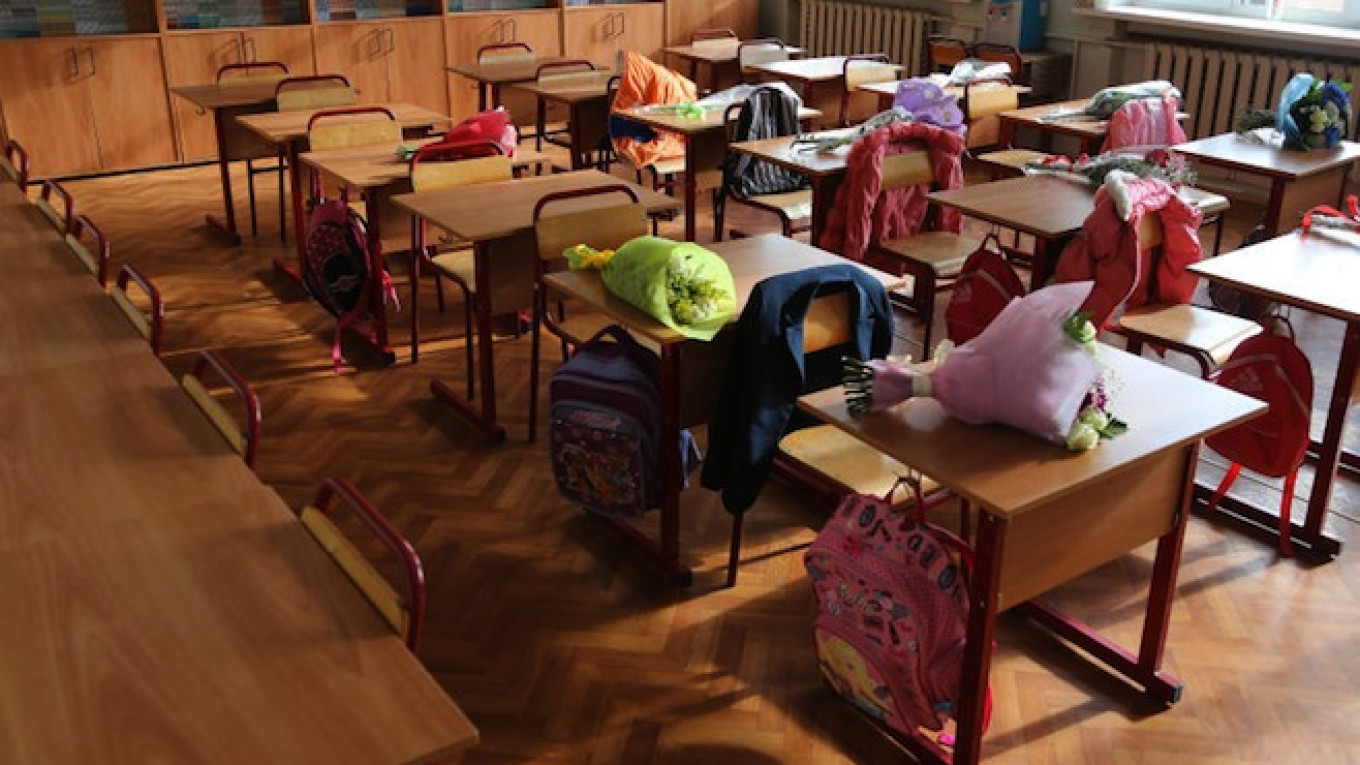A public school in Russia's southern Siberian Altai region has introduced separate education for boys and girls in an attempt to combat female “emancipation” and to instill proper “gender roles” in students, the regional AltaiPress news portal reported Wednesday.
The move by School No. 20 in the city of Biysk comes amid increasing calls in the country for a return to “traditional values,” as conservatives and Kremlin loyalists seek to counteract Western liberal ideas at a time when Moscow's relations with the West have turned fetid over the crises in Ukraine and Syria.
Biysk school principal Yelena Virbitskas said she had looked into the experience of other schools around the country that attempted single-sex classes, and determined that boys and girls who study separately show better “neurodynamic and psychological characteristics” than those who sit in class together, AltaiPress reported.
Students in single-sex classes “experience the formation of typically male and typically female qualities, the formation of gender roles, their level of learning increases substantially,” Virbitskas was quoted as saying.
While some may dispute the assertion that adherence to a “typical” gender role is a sign of better psychological adjustment, the claim of better academic performance among students in single-sex classes, if true, could be due to other factors. For instance, parents who place their children into single-sex classes may be more involved in their sons' or daughters' education than their peers, and more eager to try improving on what Russian public schools generally have to offer.
Other schools in Russia have tried single-sex classes in recent years, although most have cited different motives for their attempts — such as the supposed differences in learning styles between boys and girls, or the benefit of students not being distracted by flirting in class.
“I learned from my experience how different girls are from boys,” elementary school teacher Yevgenia Naumova was quoted as saying by the government's Rossiiskaya Gazeta daily last year, when her school in the Ural Mountains began offering single-sex classes.
“Even when she knows the answer, a girl will keep quiet and wait for somebody else to answer,” Naumova was quoted as saying. “In co-ed classes, boys were first to raise their hands, but there are none of them here.”
Russia abolished single-sex education after the Bolshevik revolution, amid general policies aimed at establishing gender equality.
Single-sex education was re-introduced in some schools during World War II, but scrapped again by a Cabinet decree in 1954, “taking into consideration the wishes of parents, teachers and society,” according to the RIA Novosti news agency. Co-ed education remained in place throughout the country until the Soviet collapse.
A number of single-sex religious schools have appeared in Russia since, and a few public schools that flirted with the practice in recent years offered a couple of single-sex classes along with co-ed ones at the same grade level.
Parents in Altai's Biysk will still get to choose between single-sex classes or co-ed ones for their children, AltaiPress reported. It did not specify whether the two types of classes will be offered in the same building, or whether parents who opt for co-ed classes would need to transfer their children to other schools.
A Message from The Moscow Times:
Dear readers,
We are facing unprecedented challenges. Russia's Prosecutor General's Office has designated The Moscow Times as an "undesirable" organization, criminalizing our work and putting our staff at risk of prosecution. This follows our earlier unjust labeling as a "foreign agent."
These actions are direct attempts to silence independent journalism in Russia. The authorities claim our work "discredits the decisions of the Russian leadership." We see things differently: we strive to provide accurate, unbiased reporting on Russia.
We, the journalists of The Moscow Times, refuse to be silenced. But to continue our work, we need your help.
Your support, no matter how small, makes a world of difference. If you can, please support us monthly starting from just $2. It's quick to set up, and every contribution makes a significant impact.
By supporting The Moscow Times, you're defending open, independent journalism in the face of repression. Thank you for standing with us.
Remind me later.






